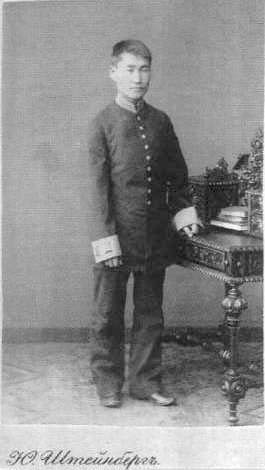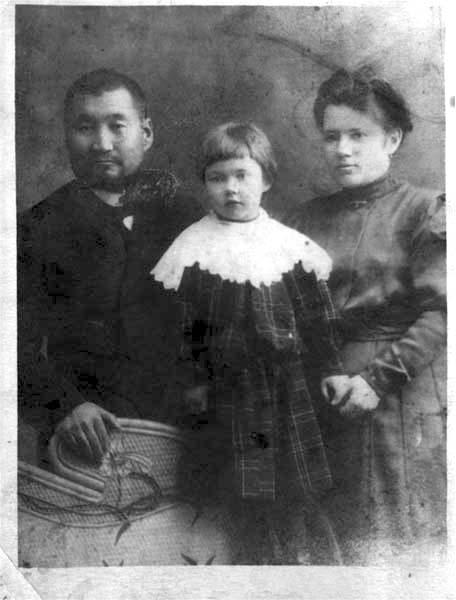
Nikolai Fedorovich Katanov (6 [May 1862, district Izium (Uzyum) near the village of Askiz - March 9, 1922, Kazan) is a Russian turkologist, professor of the Imperial Kazan University and Kazan Theological Academy, doctor of comparative linguistics, ethnographer, folklorist, public figure. It is considered the first Khakass scholar. Actual State Councilor (1915) .
He was born in the family of the ulus clerk, in 1876-1884 he studied at the Krasnoyarsk Gymnasium, which he graduated with a gold medal. In 1884-1888 he was a student at the Faculty of Oriental Languages of St. Petersburg University. On the recommendation of V. V. Radlov, he was sent to an ethnographic-linguistic expedition to Siberia and East Turkistan to study the languages and life of the Turkic tribes. In 1889-1892 he studied the peoples of Khakassia, Tuva, Semirechye, Tarbagatai and Xinjiang. Since it was not possible to get a place at the University of St. Petersburg, in 1894 Katanov moved to Kazan, having worked in this city for 28 years until his death. In 1903 he defended his thesis for a master's degree - "Experience in the study of the Uryanghai language", in 1907 was approved by the doctor of comparative linguistics in the totality of works. In 1911-1917 he taught mainly at the Kazan Theological Academy. Ordinary professor of the Theological Academy since 1915, in 1919 he was elected professor at the Kazan University for the All-Russian competition, the results of which were approved by the People's Commissariat of Education in 1921.
Education (1869-1884)
In 1869 Nikolai Katanov was enrolled in the one-class village school, which had just opened in Askiz, which was taught by his uncle Efim Semenovich, who combined the posts of the clerk of the steppe duma, the church elder, the shopkeeper, etc. He can not get an education in the school, but in Askiz was kept house and intermediate base Krasnoyarsk gold miner P. I. Kuznetsov, who had a library and sought to educate local "aliens". The school in Askiz was located in his own house, and Nikolai widely used books for self-education.
The first teacher of Katanov was I. Karatanov, an employee of Kuznetsov, who also had a small collection of books on the peoples of Siberia; It was he who instilled in Nikolai a deep interest in the culture and history of the Turkic peoples. After the death of his father in 1874, Nicholas, who worked as a shepherd in the summer, entered into the custody of his uncle, who arranged him as a clerk in the Askiz Steppe Duma. For two years of service, Katanov mastered the Russian diploma and calligraphy. Feeling the need to continue education, in 1876, Nicholas decided to enter the Krasnoyarsk gymnasium. In this he could help PI Kuznetsov, who was then the city's head of Krasnoyarsk. Having enlisted the recommendations of I. I. Karatanov, Nicholas on a boat on Abakan and Yenisei reached the city and was enrolled in the gymnasium.
Group of students of the Krasnoyarsk grammar school. Katanov is sitting in the center. (Not later than 1884)
The Petersburg period (1884-1893)
At St. Petersburg University Katanov was August 15, 1884 enlisted in the category of Arabic-Persian-Turkish-Tatar literature. He received a fundamental education, including a wide range of humanitarian and special oriental disciplines. Having mastered French and German at the gymnasium, Katanov studied Arabic, Persian, Ottoman, Tatar, Bashkir and Kazakh languages at the university, as well as the Chagatai language, the history and literature of the Turkic peoples, the history of the East, and Muslim law. In addition, Katanov privately engaged in phonetics of Turkic languages at home with VV Radlov. Radlov only recently moved to St. Petersburg from Kazan; In the face of Katanov he found a very diligent and attentive student. The student of Katanov was exceptionally accurate and hardworking, it is recalled from the memoirs that he attended and stenographed all the lectures without exception. At Radlov, he learned a comparative-historical method in the study of the Turkic languages, which aroused his interest even in the gymnasium.

Student of the Faculty of Oriental Studies Nikolai Katanov. Photographic studio of J. Steinberg, (no later than 1888)
The Kazan period (1894-1922)
January 12, 1894 Katanov arrived in Kazan, in which the researcher had to live 28 years - until his death. By that time, the teaching of Oriental languages at the university had come to a final decline, and Nikolai Fyodorovich was to restore this area of educational and scientific activity. However, as an extraordinary professor, Katanov read only elective courses. However, very quickly his subjects became popular among students. In 1894/1895 academic year N.F. Katanov read the following courses at the Faculty of History and Philology, demonstrating the extraordinary breadth and versatility of his interests:
The language of the Kazan Tatars (grammar and reading);
Review of the Turkish-Tatar tribes (the history of ancient and new Turkic states, the life of tribes, reports of foreigners about the Turks);
The history of Turkish-Tatar literature (Ottoman, Chagatai, Common Turk);
Comparative grammar of Turkic languages.
In the following, 1895/1896 academic year NF Katanov additionally began to read the courses of Arabic and Persian languages, and then the grammar of Altaic languages, the grammar of Kazakh and Kyrgyz languages and even a special course "Inscriptions on coins of the Golden Horde and tombstones of the Kazan and Bulgarian khanates"
The Katanov family in 1904
Burdened with a lot of worries at the university and the OAE, Katanov took up the execution of any work, if only it was within his area of interest. He immediately joined the activities of the Translation Commission under the fraternity of St. Guria on the translation of the New Testament into "languages of Siberian non-Russians". Since 1907, he became chairman of the Translation Commission of the Kazan Academic District and a member of the Press Committee. During this period he was summoned to Petersburg several times for meetings on the formation of foreigners, and from 1907 to Orenburg for meetings of teachers of foreign schools. In addition, since 1905, Katanov was a member of the council of the Kazan City Museum, until 1917 headed his historical and ethnographic department and in 1906-1912 and 1914-1917 he was chairman of the museum council.
NF Katanov in the uniform of the professor of the Kazan University with awards. Photo of 1909 year




















